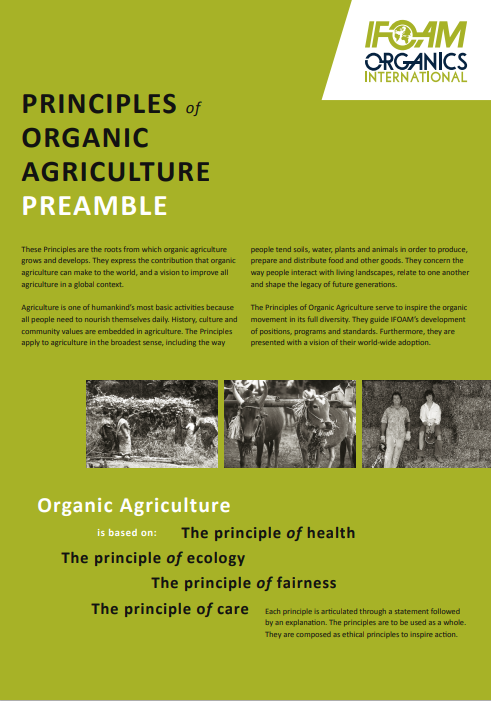 The four principles of organic agriculture
The four principles of organic agriculture
- The Principle of Health
- The Principle of Care
- The Principle of Ecology
- The Principle of Fairness
These principles are the roots from which Organic Agriculture grows and develops. They express the contribution that Organic Agriculture can make to the world.
Composed as inter-connected ethical principles to inspire the organic movement in its full diversity, they guide our development of positions, programs and standards.
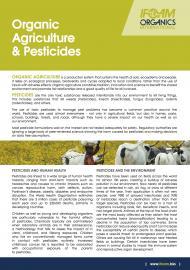 Organic agriculture & pesticides
Organic agriculture & pesticides
Pesticides are the only toxic substances released intentionally into our environment to kill living things. This includes substances that kill weeds (herbicides), insects (insecticides), fungus (fungicides), rodents (rodenticides), and others.
The use of toxic pesticides to manage pest problems has become a common practice around the world.
Pesticides are used almost everywhere - not only in agricultural fields, but also in homes, parks, schools, buildings, forests, and roads, although they have a severe impact on our health as well as on our environment.
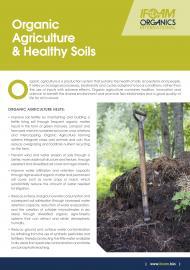 Organic agriculture & healthy soils
Organic agriculture & healthy soils
Organic agriculture is a production system that sustains the health of soils, ecosystems and people.
It relies on ecological processes, biodiversity and cycles adapted to local conditions, rather than the use of inputs with adverse effects.
Organic agriculture combines tradition, innovation and science to benefit the shared environment and promote fair relationships and a good quality of life for all involved.
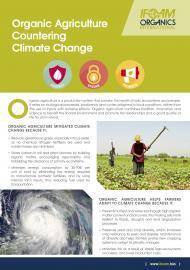 Organic agriculture countering climate change
Organic agriculture countering climate change
Organic agriculture mitigates climate change by reducing green house gasses, storing carbon in soil and plant biomass, and minimising energy consumption.
Organic agriculture helps farmers adapt to climate change by:
- preventing nutrient and water loss through high orqanic content and soil cover
- preserving seed and crop diversity
- minimising risk through stable agro-ecosystems and yields, and lower production costs
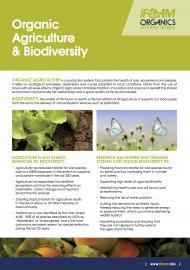 Organic agriculture & biodiversity
Organic agriculture & biodiversity
Biodiversity, the variety of life found on earth, is the foundation of all agriculture. It supports our food supply from the soil to the delivery of vital ecosystem services such as pollination.
Organic systems can sustain biodiversity by:
- providing food and shelter for wild species found on farms and thus increasing them in number and variety
- ssupporting high levels of agro-biodiversity
- maintaining healthy soils and soil fauna, such as earthworms
- reducing the risk of water pollution
- cutting the demand for synthetic inputs, thereby reducing the need to generate energy to produce them, which can involve destroying wildlife habitat
- nourishing ecosystems and ensuring that they are not cleared to further extend the agricultural frontier
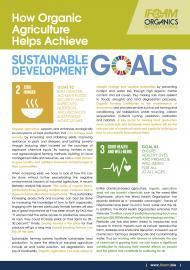 Organic agriculture & sustainable development
Organic agriculture & sustainable development
The Sustainable Development Goals (SDGs) are the blueprint to achieve a better and more sustainable future for all.
They address the global challenges we face, including those related to poverty, inequality, climate, environmental degradation, prosperity, and peace and justice. The Goals interconnect and in order to leave no one behind, it ís important that we achieve each Goal and target by 2030.
Organic agriculture, if implemented in a truly sustainable manner, offers viable solutions to many of the problems the SDGs are meant to tackle, as they have clear links to the 4 Principles of Organic Agriculture: Health, Ecology, Fairness and Care.
Investing in organic agriculture can address not only hunger and malnutrition but also other challenges including poverty; water use; climate change; and unsustainable production and consumption.